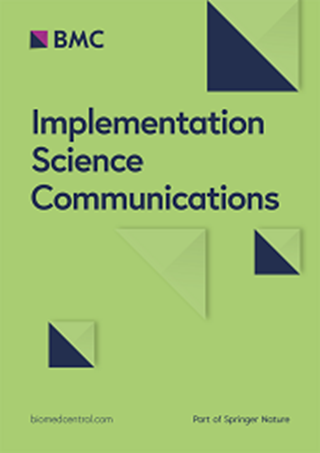审计和反馈,大规模减少不必要的临床变异:实施战略机制的现实主义研究
IF 8.8
1区 医学
Q1 HEALTH CARE SCIENCES & SERVICES
引用次数: 0
摘要
医院护理中不必要的临床差异包括服务使用不足、过度使用或滥用。审计和反馈是减少不合理变异的常用策略,但其效果在不同情况下差异很大。我们旨在确定审计和反馈对不必要的临床变异产生影响的实施策略、机制和背景情况。现实主义研究考察了澳大利亚新南威尔士州在 2017 年至 2021 年间实施的一项全州范围的价值医疗计划。该计划中的三项举措包括审计和反馈,以减少不同病症住院护理中的不必要差异。在制定最初的审计和反馈计划理论时,使用了多种数据来源:系统性回顾、现实主义回顾、计划文件回顾以及与主要计划利益相关者的非正式讨论。然后对 56 名参与者进行了半结构式访谈,以反驳、完善或确认最初的项目理论。使用背景-机制-结果框架对 11 份记录誊本的数据进行了追溯分析,并将其编码为审核和反馈计划理论。三个专家小组对计划理论进行了验证:高级卫生领导(n = 19)、临床创新机构(n = 11)和卫生部(n = 21)的工作人员。该计划的审核和反馈实施策略通过八个机制化流程运行。当临床医生(1)有主人翁感和认同感,(2)能够理解所提供的信息,(3)受到社会影响的激励,以及(4)对建议的改变承担责任和义务时,该策略就能很好地发挥作用。当审计过程导致(5)当前实践合理化而不是创造学习机会,(6)认为不公平和担心数据完整性,(7)制定的改进计划没有得到遵守,以及(8)认为侵犯了专业自主权时,该策略的成功就受到了限制。如果审计人员与当地临床医生保持联系,制定有意义的审计指标、明确的改进计划并尊重临床专业知识,那么审计和反馈策略可能有助于减少不必要的临床护理差异。我们提出了 "审计和反馈的规模化实施模型",为审计和反馈的理论发展做出了贡献。建议包括限制审计指标的数量、让临床人员和地方领导参与反馈以及提供反思的机会。本文章由计算机程序翻译,如有差异,请以英文原文为准。
Audit and feedback to reduce unwarranted clinical variation at scale: a realist study of implementation strategy mechanisms
Unwarranted clinical variation in hospital care includes the underuse, overuse, or misuse of services. Audit and feedback is a common strategy to reduce unwarranted variation, but its effectiveness varies widely across contexts. We aimed to identify implementation strategies, mechanisms, and contextual circumstances contributing to the impact of audit and feedback on unwarranted clinical variation. Realist study examining a state-wide value-based healthcare program implemented between 2017 and 2021 in New South Wales, Australia. Three initiatives within the program included audit and feedback to reduce unwarranted variation in inpatient care for different conditions. Multiple data sources were used to formulate the initial audit and feedback program theory: a systematic review, realist review, program document review, and informal discussions with key program stakeholders. Semi-structured interviews were then conducted with 56 participants to refute, refine, or confirm the initial program theories. Data were analysed retroductively using a context-mechanism-outcome framework for 11 transcripts which were coded into the audit and feedback program theory. The program theory was validated with three expert panels: senior health leaders (n = 19), Agency for Clinical Innovation (n = 11), and Ministry of Health (n = 21) staff. The program’s audit and feedback implementation strategy operated through eight mechanistic processes. The strategy worked well when clinicians (1) felt ownership and buy-in, (2) could make sense of the information provided, (3) were motivated by social influence, and (4) accepted responsibility and accountability for proposed changes. The success of the strategy was constrained when the audit process led to (5) rationalising current practice instead of creating a learning opportunity, (6) perceptions of unfairness and concerns about data integrity, 7) development of improvement plans that were not followed, and (8) perceived intrusions on professional autonomy. Audit and feedback strategies may help reduce unwarranted clinical variation in care where there is engagement between auditors and local clinicians, meaningful audit indicators, clear improvement plans, and respect for clinical expertise. We contribute theoretical development for audit and feedback by proposing a Model for Audit and Feedback Implementation at Scale. Recommendations include limiting the number of audit indicators, involving clinical staff and local leaders in feedback, and providing opportunities for reflection.
求助全文
通过发布文献求助,成功后即可免费获取论文全文。
去求助
来源期刊

Implementation Science
医学-卫生保健
CiteScore
14.30
自引率
11.10%
发文量
78
审稿时长
4-8 weeks
期刊介绍:
Implementation Science is a leading journal committed to disseminating evidence on methods for integrating research findings into routine healthcare practice and policy. It offers a multidisciplinary platform for studying implementation strategies, encompassing their development, outcomes, economics, processes, and associated factors. The journal prioritizes rigorous studies and innovative, theory-based approaches, covering implementation science across various healthcare services and settings.
 求助内容:
求助内容: 应助结果提醒方式:
应助结果提醒方式:


